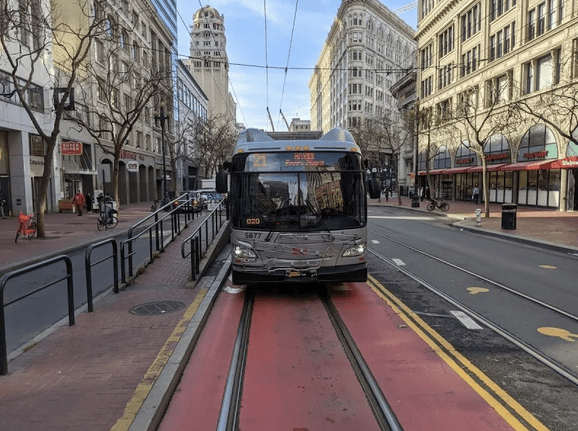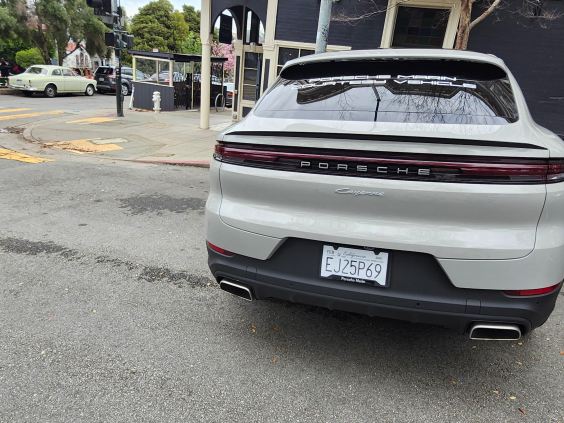The San Franicisco Transit Riders will be holding a virtual event Friday honoring transit workers, as part of its annual "Transit Week" celebration of all things Muni. The focus of this year's event is to push for desperately needed funding for Muni and other transit agencies in the Bay Area.
"We can't count on federal help because of all the crazy going on in Washington," said the SFTR's Cat Carter, in a phone interview with Streetsblog. "Nancy Pelosi has been part of the move to get $32 billion transit needs nationwide, and we can't count on that, and transit's facing a real cliff."
Carter is referring to the on-again, and mostly off-again, negotiations between a COVID-infected President Donald Trump and House Democrats over a second phase in emergency funding to enable trains and buses to keep running. "This is the time to vote yes on RR and yes on 15. In the next month, that's what you can do to save transit," said Carter.
RR, of course, is a one-eight cent sales tax to help fund Caltrain operations, and 15 would allow property tax adjustments on commercial parcels--both are endorsed by Streetsblog and will go a long way towards allowing transit systems to function.
Additionally, the SFTR has composed a letter, signed by 52 organizations, calling on SFMTA and the city to redouble their efforts to build emergency transit-only lanes and other work to keep the buses running.
From the letter:
Temporary emergency transit only lanes provide faster and more reliable service. They support public health and economic recovery by preventing buses from being stuck in traffic. Efficient buses save San Francisco money that can be reinvested in additional transit service. These temporary pilot projects also give people the opportunity to experience the benefits of the project and to weigh in on how they might be c hanged or improved to better meet rider and community needs.
Additional transit funding is also an important part of San Francisco's transit recovery. Over 40 Muni lines have been indefinitely suspended. Without additional funding, SFMTA will be $546 million in debt by 2024 and be forced to make additional cuts to service, sending Muni into the 'transit death spiral.' We need new, dedicated sources of transit funding if Muni is to recover and thrive following the pandemic.
The letter also calls for making public transit as safe as possible for Muni riders and operators, who are "...crucial to keeping the city moving. 31% of all Bay Area riders are essential workers, and people riding transit today are more likely to be transit dependent than the average rider or resident. They are also more likely to be lower-income and people of color. San Francisco must dedicate sufficient resources to make sure transit workers and riders are safe."
Mayor @LondonBreed grew up on Muni. She's working with us for the strong recovery transit riders need! Join us to learn more, get involved, & celebrate folks working hard every day to make Muni better for all riders! #SaveTransit #TransitIsEssential https:https://t.co/mZnwOxSMWy pic.twitter.com/VviiW8r5QG
— SF Transit Riders (@SFTRU) October 8, 2020
“If we act now to make sure public transit is treated as the essential service that it is, to make sure it gets the funding that it needs, that it gets the priority that it needs, and that it is safe and clean for everyone to return to, we can lay the groundwork not only for a strong recovery, but for a better system than we had in February 2020,” said Mark Cordes, SFTR Executive Director, in a statement. “Muni never went below 85,000 daily riders even during the most restrictive shelter-in-place. It is an essential service that can’t be allowed to disappear. The pandemic has made it all the more obvious that public transit has a critical role to play in equity, mobility, social justice, economic recovery, combating climate change, and safe streets.”
The Friday awards event, meanwhile, is a tribute to Muni workers. "A strong Muni recovery depends on all the dedicated people who work hard every day to make Muni work better for all riders," wrote the SFTR in its announcement. The "Rider First" awards will begin at 5 p.m., Friday, October 9. Carter suggests advocates grab a beer or whatever their favorite Friday evening drink is and join them online.






